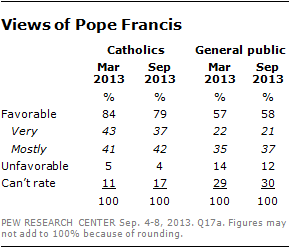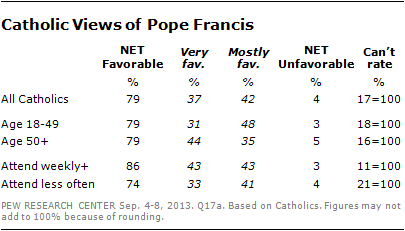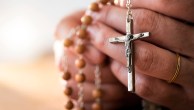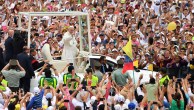
After six eventful months, Pope Francis is rated favorably by eight-in-ten U.S. Catholics (79%). Just 4% of Catholics say they have an unfavorable view of the first Latin American pope, while 17% express no opinion or say they have not heard enough about Francis to have an opinion.
The early period of Francis’ papacy has been the subject of considerable media coverage. He recently made headlines by condemning the use of chemical weapons and leading a prayer vigil for peace in Syria. He previously had received media attention for his vow to reform the Vatican bureaucracy; washing the feet of young prisoners (including two women) during a Holy Thursday ceremony; and taking a humble approach to the trappings of the papacy, including his decision to reside in a modest residence rather than more spacious accommodations. The pope also has surprised a number of individuals around the world by reportedly calling to discuss problems in their lives. Perhaps most prominently, Francis made headlines in July for his comments about homosexuality on his return from World Youth Day in Brazil, when he said to reporters aboard his plane: “If someone is gay and he searches for the Lord and has good will, who am I to judge?”
Some of these actions, such as the washing of women’s feet, have drawn criticism from traditionalists in the church, according to news accounts. But a new Pew Research Center survey conducted Sept. 4-8, 2013, finds that views of Pope Francis among U.S. Catholics are largely unchanged since the days immediately following his ascension to the papacy in March. The survey also finds that roughly six-in-ten Americans overall (58%) rate Francis favorably, also unchanged since March.
Francis’ current favorability rating among U.S. Catholics is roughly equivalent to the high water mark for Pope Benedict XVI, who was rated favorably by 83% of U.S. Catholics in April 2008 following his visit to the U.S. Pope John Paul II was rated favorably by upwards of nine-in-ten U.S. Catholics in three separate Pew Research polls in the 1980s and 1990s.

Among U.S. Catholics, Francis receives his strongest support from those who say they attend Mass at least once a week, with 86% of this group expressing a favorable view of the pontiff. But even among Catholics who attend Mass less often, the large majority (74%) express favorable views of the pope. Compared with weekly Mass attenders, Catholics who attend Mass less often are more likely to say they are unable to express an opinion about the pope (21% vs. 11%). Among both weekly Mass attenders and those who attend religious services less often, only about one-in-twenty Catholics say they have an unfavorable view of Pope Francis.
Nearly eight-in-ten (79%) Catholics under age 50 rate Francis favorably, as do an identical share of Catholics ages 50 and older. Older Catholics, however, are slightly more likely than younger Catholics to say they have a very favorable opinion of the pope (44% vs. 31%).
About the Survey
The analysis in this report is based on telephone interviews conducted Sept. 4-8, 2013, among a national sample of 1,506 adults, 18 years of age or older, living in all 50 U.S. states and the District of Columbia (751 respondents were interviewed on a landline telephone, and 755 were interviewed on a cellphone, including 401 who had no landline telephone). The survey was conducted by interviewers at Princeton Data Source under the direction of Princeton Survey Research Associates International. A combination of landline and cellphone random digit dial samples were used; both samples were provided by Survey Sampling International. Interviews were conducted in English and Spanish. Respondents in the landline sample were selected by randomly asking for the youngest adult male or female who is now at home. Interviews in the cell sample were conducted with the person who answered the phone, if that person was an adult 18 years of age or older. For detailed information about our survey methodology, see http://pewresearch.org/pewresearch-org/politics/methodology/.
The combined landline and cellphone sample are weighted using an iterative technique that matches gender, age, education, race, Hispanic origin and nativity, and region to parameters from the 2011 U.S. Census Bureau’s American Community Survey and population density to parameters from the decennial census. The sample also is weighted to match current patterns of telephone status and relative usage of landline and cellphones (for those with both), based on extrapolations from the 2012 National Health Interview Survey. The weighting procedure also accounts for the fact that respondents with both landline and cellphones have a greater probability of being included in the combined sample and adjusts for household size among respondents with a landline phone. Sampling errors and statistical tests of significance take into account the effect of weighting. The following table shows the unweighted sample sizes and the error attributable to sampling that would be expected at the 95% level of confidence for different groups in the survey:

Sample sizes and sampling errors for other subgroups are available upon request.
In addition to sampling error, one should bear in mind that question wording and practical difficulties in conducting surveys can introduce error or bias into the findings of opinion polls.
Photo Credit: © CLAUDIO PERI/ANSA/Corbis




